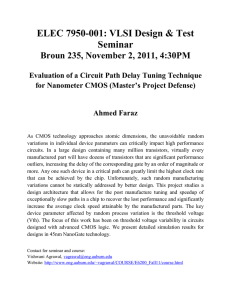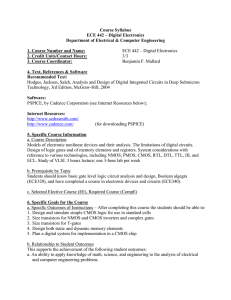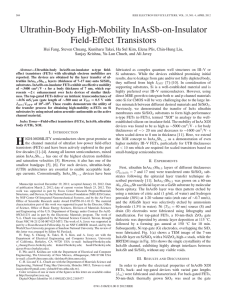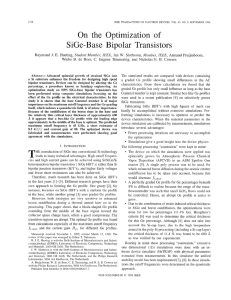ECE 7032: Physical Electronics of Advanced Semiconductor Devices
advertisement
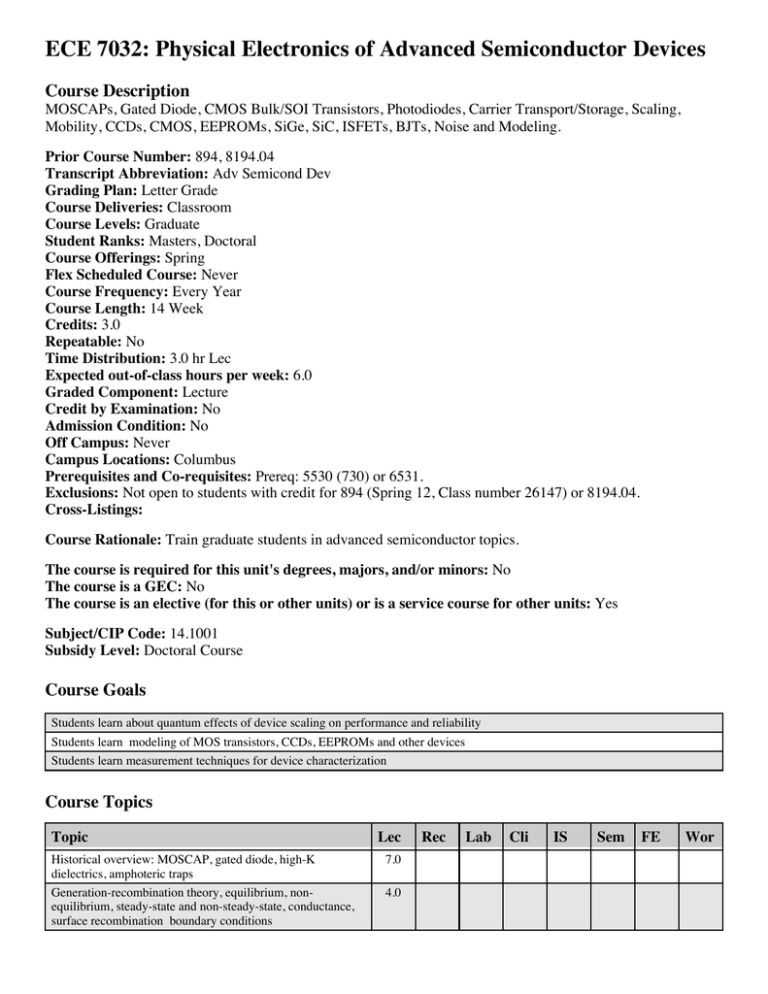
ECE 7032: Physical Electronics of Advanced Semiconductor Devices Course Description MOSCAPs, Gated Diode, CMOS Bulk/SOI Transistors, Photodiodes, Carrier Transport/Storage, Scaling, Mobility, CCDs, CMOS, EEPROMs, SiGe, SiC, ISFETs, BJTs, Noise and Modeling. Prior Course Number: 894, 8194.04 Transcript Abbreviation: Adv Semicond Dev Grading Plan: Letter Grade Course Deliveries: Classroom Course Levels: Graduate Student Ranks: Masters, Doctoral Course Offerings: Spring Flex Scheduled Course: Never Course Frequency: Every Year Course Length: 14 Week Credits: 3.0 Repeatable: No Time Distribution: 3.0 hr Lec Expected out-of-class hours per week: 6.0 Graded Component: Lecture Credit by Examination: No Admission Condition: No Off Campus: Never Campus Locations: Columbus Prerequisites and Co-requisites: Prereq: 5530 (730) or 6531. Exclusions: Not open to students with credit for 894 (Spring 12, Class number 26147) or 8194.04. Cross-Listings: Course Rationale: Train graduate students in advanced semiconductor topics. The course is required for this unit's degrees, majors, and/or minors: No The course is a GEC: No The course is an elective (for this or other units) or is a service course for other units: Yes Subject/CIP Code: 14.1001 Subsidy Level: Doctoral Course Course Goals Students learn about quantum effects of device scaling on performance and reliability Students learn modeling of MOS transistors, CCDs, EEPROMs and other devices Students learn measurement techniques for device characterization Course Topics Topic Lec Historical overview: MOSCAP, gated diode, high-K dielectrics, amphoteric traps 7.0 Generation-recombination theory, equilibrium, nonequilibrium, steady-state and non-steady-state, conductance, surface recombination boundary conditions 4.0 Rec Lab Cli IS Sem FE Wor Topic Lec CCDs, carrier transport and operation, transfer efficiency, charge control model 4.0 CMOS transistors (bulk, SOI, mobility, transconductance, subthreshold operation, SPICE modeling, short-channel and narrow-width effects, surface and buried channel devices, propagation delay, ion-sensitive FETs (ISFETs), hot carrier injection 7.0 Charge pumping, interface and dielectric traps 3.0 Physics of tunneling- floating gate and SONOS EEPROMs 4.0 Theory of drift-field bipolar junction transistors (BJTs) 4.0 SiGe FETs and SiC devices 3.0 Advanced research topics (e.g. mobility, surface roughness, Coulomb scattering, noise) 3.0 Rec Lab Cli IS Sem FE Wor Grades Aspect Percent Homework 60% Midterm Exam 20% Final exam 20% Representative Textbooks and Other Course Materials Title Author Course notes and selected papers from the literature ABET-EAC Criterion 3 Outcomes Course Contribution *** *** *** College Outcome a An ability to apply knowledge of mathematics, science, and engineering. b An ability to design and conduct experiments, as well as to analyze and interpret data. c An ability to design a system, component, or process to meet desired needs. d An ability to function on multi-disciplinary teams. e An ability to identify, formulate, and solve engineering problems. f An understanding of professional and ethical responsibility. g An ability to communicate effectively. h The broad education necessary to understand the impact of engineering solutions in a global and societal context. i A recognition of the need for, and an ability to engage in life-long learning. j A knowledge of contemporary issues. k An ability to use the techniques, skills, and modern engineering tools necessary for engineering practice. Prepared by: Betty Lise Anderson
